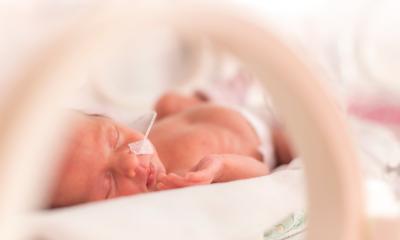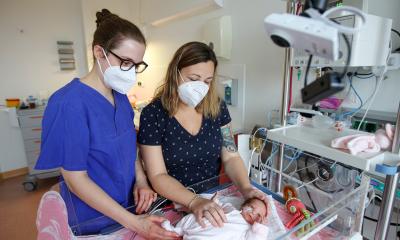First Czech "test-tube" baby celebrated 25th birthday
By Rostislav Kuklik
The first Czech test-tube baby was born, woman in childbed delivered smoothly on 4th November 1982, and healthy baby-boy was 51 cm tall, and weighed 3.65 kg. A medical team from Moravian town of Brno led by embryologist Milan Dvorak and gynecologist Ladislav Pilka was behind all this happy-ended artificial fertilization quarter a century ago.

On 25th July 1978, Louise Joy Brown, the world's first successful test-tube baby was born in UK. Her “creators” embryologist Robert Geoffrey Edwards and gynecologist Patrick Christopher Steptoe used in-vitro fertilization (IVF) method when oocyte is laparoscopically taken out of mother’s ovary, fertilized in-vitro, and early stage embryo (blastocyst) is returned back to her womb. Slightly longer than 4 years after this unbelievable achievement of medicine first Czech test-tube baby was born, woman in childbed delivered smoothly on 4th November 1982, and healthy baby-boy was 51 cm tall, and weighed 3.65 kg. A medical team from Moravian town of Brno led by embryologist Milan Dvorak and gynecologist Ladislav Pilka was behind all this happy-ended artificial fertilization quarter a century ago. They prepared hormonally the mother-to-be, de-obliterated her tuba uterina operatively, inserted both oocyte and spermatocyte in it, and the rest was left up to a nature's discretion. This method called GIFT (Gamete Intra-Fallopian Transfer) helped them to become the first successful physicians in the field in CEE (Central and Eastern Europe). Unfortunately, not much else is known about first Czech test-tube boy, his mother insisted strongly on full anonymity to shelter her son from being prejudiced or jibbed at by other children. Today, situation is different as there are already some 23 thousand other test-tube babies living in the Czech republic, and around one million of them world-wide.
In direct relation to Czech inhabitants’ reproductive needs, we must not forget to mention the fact that reproduction medicine is also very attractive for childless foreign couples who seek help in CR. Firstly, what the irresistible attraction consist of, and why Westerners unable to conceive their own off-springs naturally are rolling into Czech clinics? It’s partly because of low prices (remarkably cheaper than in Western Europe), and partly because of high success rate. As far as prices, IVF attempts are usually conducted in 10-day cycles, and the price for one cycle (including medication) is between CZK 50.000 and 70.000 (~ EUR 1.800 to 2.600) while in the rest of Europe those interested in having such treatment performed would pay between EUR 5.500 to 6.200 per cycle, and in USA one cycle can cost as much as $ 18.500 (~ EUR 14.300). As far as success rates, the hopes are high too. Assisted reproduction success rate in CR are similar to those in United States – over 35%, which is better than in the rest of Europe, for example by around 5% then in Germany. Czech women are in better position than other European females because until they reach 40 years of age they have granted access to IVF for free, with the first three cycles covered by health-care insurance.
Isn’t Czech republic simply the destination of hope for many? Yes, it is, and the numbers of hope-seekers are expected to grow significantly in the near future.
07.01.2008





